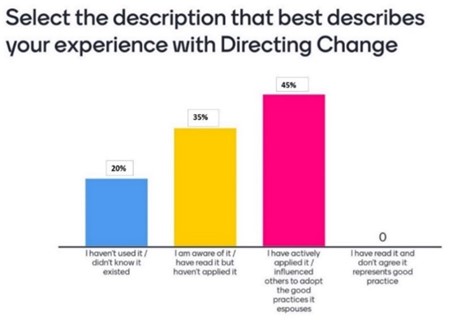Association for Project Management
|
|
Good governance enables successful projects, so why don’t we apply good practice consistently?
Blog posted by: Martin Samphire, 20 Apr 2022.

I recently facilitated a virtual discussion regarding why we don’t consistently apply good governance principles on projects and programmes. I shared my and the APM Governance SIG views on:
- The key reasons for success and failure and how these mainly relate to governance.
- What good governance looks like and 10 components of healthy governance.
The principles for good governance of projects and programmes are well known but not applied consistently. The principles are also laid out in APM guide Directing Change: A Guide to Governance of Project Management, 3rd edition, which also includes extensive checklists to aid specific roles.
But what’s causing the inconsistency? We had an open conversation with our audience to investigate the reasons why poor governance practice persists.

We asked the audience to vote on their prior use of the Directing Change guide. 45% had applied it or influenced others to apply the good practice from the guide. However, 55% were either not aware of it, hadn’t read it and/or had not applied it.
We shared the eight commonly quoted reasons for project failure (OGC/IPA source). Most of the eight reasons are issues of poor governance and I asked the audience to vote on those that they had experienced for themselves. The four areas that the audience were most concerned about were:
- lack of clear senior management (and ministerial) ownership and leadership,
- inadequate resources and skills to deliver the total delivery portfolio,
- lack of a clear link between the project and the organisation’s key strategic priorities,
- lack of effective engagement with stakeholders.
So how we do solve this? We shared a list of 10 good practice components for healthy governance:
- Alignment (of project to strategic objectives) and relationships
- Vision and strategic roadmap
- Golden thread of delegation and accountabilities
- Clearly allocated roles
- Requirements – keeping the end destination (both outcome goal and delivery objectives) in sight
- Framework, process and decision gates
- Capacity and competence (for all key roles including appropriate incentives to perform)
- Stakeholder engagement and transparency (of reporting and communications)
- Assurance
- Leadership, collaboration and supportive culture.
These principles are laid out in APM guide Directing Change, which also includes extensive checklists to aid specific roles. Too few project professionals are aware of this and I would recommend that everyone reads and applies the good practice contained in it. APM members can download a copy for free (if eligible) at Directing Change.
We asked our virtual audience how often the above components had been present on recent projects. Only 8% reported that all the 10 components had been present. Most reported that only about half of the components had been present. 17% stated that fewer than 2 out of the 10 components had been present.
There was then a discussion on why we are not consistently adopting known good governance practice, which produced a wide range of comments from the audience, for example: political interference, time pressures, too many leaders, lack of awareness, poor leadership, people’s attitude, not sufficient demand, etc.
We analysed and categorised our audience’s comments into four groups:
- 48% felt it was down to an unsupportive culture
- 26% felt it was down to lack of awareness and/or poor competence
- 24% felt it was down to poor leadership
- 2% felt it was down to poor process, e.g. risk management.
So the reasons given for not applying good governance practice are multi-faceted. They are rarely to do with poor structure or process but rather about the lack of an unsupportive organisational culture, lack of awareness of what constitutes good practice (especially at senior level) and poor leadership. To an extent this could appear to be ‘blaming’ others – the more senior colleagues in our organisation – rather than taking on a personal responsibility. However, these findings are consistent with other surveys and research.
We all have a role to play in understanding what constitutes good governance practice and then being courageous to challenge colleagues (even senior ones) to adopt such good practice rather than live in a project environment where the chance of failure is high. Let’s all apply our knowledge of good governance practice to bring about a radical improvement in governance and thereby project outcome success.
Directing Change will be undergoing a refresh over the next 18 months to build in feedback from its use and also adopt other relevant inputs, e.g. the advent of ISO 37000 on good governance. Anyone interested in being involved and contributing to the development of this update should get in touch: gopmsig@apm.org.uk.
You may also be interested in:
- What is governance?
- Key questions for the governance of co-owned projects
- Directing Change: A Guide to Governance of Project Management, 3rd edition
About the Author
Martin Samphire
Martin is the owner and Managing Director of 3pmxl Ltd, a consultancy specialises in helping clients to transform their business using structured P3M approaches.
Martin is Chairman of the Association for Project Management (APM) Specific Interest Group (SIG) on Governance. The Governance SIG has developed guidelines for Governance of Project Management, including 'Directing Change', 'Governance of Multi-owned Projects', 'Sponsoring Change' and ‘Directing Agile Change’. He authored chapter 19 on Governance in the 2nd Edition of the Gower Programme Management Handbook (2016). He is also a member of a voluntary group, the P3M Data Club.
He has over 30 years management consulting, change, project, programme and portfolio implementation experience in both the private and public sectors - in the UK and internationally.
Martin is a mechanical engineer by training and started his career in major capital project contracting in the petrochemical sector.
Original article link: https://www.apm.org.uk/blog/good-governance-enables-successful-projects-so-why-don-t-we-apply-good-practice-consistently/
- RESOURCES
- MEMBERSHIP
- CHARTERED STANDARD
- QUALIFICATIONS AND TRAINING
- JOBS AND CAREERS
- NEWS AND OPINION
- COMMUNITY
- EVENTS
- BOOKS
.gif)

.gif)